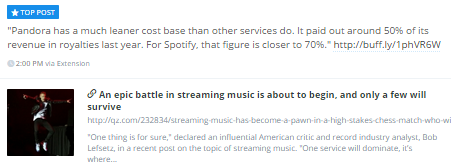Several popular items I posted last week on Linkedin and Twitter shared a theme named Irving Azoff:
- "If you're looking for money, you're better off selling one of your planes." - Irving Azoff to Jimmy Buffett when Buffett asked Spotify for a "raise"
- Azoff's New Global Music Rights Venture Seeks Higher Royalties for Songwriters, New York Times article by Ben Sisario
- Hollywood Reporter Exclusive by Eriq Gardner: Irving Azoff Says That YouTube Lacks Licensing Rights to 20,000 Songs
However, another popular YouTube tidbit that I shared with my LinkedIn connections had to do with good ol' advertising revenue: Per Jason Calacanis, "YOUTUBE has grabbed about 10% of television revenue"
More music items that engaged my connections on LinkedIn include:
More music items that engaged my connections on LinkedIn include:
- "Performers & master rights owners..make about 14 times..[that of] songwriters & publishers..for..digital platforms"
- Auditrix: Highlights from The California Copyright Conference's October 2014 Music Royalties Dinner
- "Spotify’s ties to peer-to-peer—a huge catalog, an on-demand interface, and a free, ad-supported version—means it threatens profits more than any other platform."
- “For a big hit today, there are about 700,000 #royalty #streams, just for one song,” Los Angeles Times quotes Willard Ahdritz
My Twitter followers @Auditrix were most engaged in the following items:
- Due to "court rulings, the royalty rate Pandora pays Sony/ATV reverted to the 1.85%...from the 5%" it negotiated.
- "There are no mutual funds for music royalties yet."
- EU Court rules content embedding is not copyright infringement | Music Week
- Will Half of Terrestrial Radio Stations Disappear? | Mark Ramsey Media LLC
- Spotify's Twitter campaign got hijacked by people demanding fair pay | Death and Taxes
On the copyright front, there was movement last week in one of the most interesting cases that I am following, between Smokey Robinson and his ex-wife, Claudette. Everyone I know who knows them both think it is too bad that they are litigating, so even though the issue of whether state community property laws or Federal copyright laws apply to royalties for terminated copyright grants is very interesting, I was nevertheless happy to read that the parties dropped their suit (see http://t.co/8pt5xyFxnQ) ...but, upon sharing this news in my @Auditrix Twitter feed, the reporter who has had the best coverage of this case - Eriq Gardner at the Hollywood Reporter - suggested that we have not seen the end of this dispute (see the link Mr. Gardner shared here and follow him on Twitter here). In any event, if you are an attorney or business manager, keep an eye on this case - the outcome could impact your clients!
Tencent was another company in the news last week due to its partnership with Warner Music Group in China (see this, this, this and this), but the most popular bit that I shared about Tencent last week was via my @RoyaltyExpert Twitter feed, which focuses more on games than music: Tencent said that titles on its games portal QQ are better at making money than games on WeChat
Other top games items I shared last week:
- Game industry growing four times faster than US economy - ESA
- "Zynga may have stopped the bleeding for now: daily active user loss slows"
- Video Game Audits: What You Need to Know International Game Developers' Association's Business and Legal Webinar
# # #
For more music news, follow me @Auditrix. For interactive games and other IP royalty, business and litigation news, you should follow me @RoyaltyExpert.



















